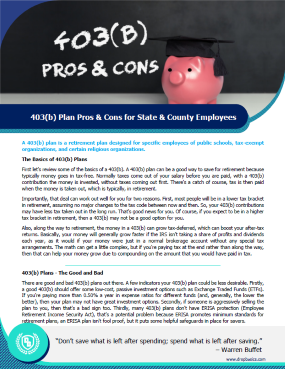What’s a 403(b) Plan?
A 403(b) plan is a retirement plan designed for specific employees of public schools, tax-exempt organizations, and certain religious organizations.
The Basics of 403(b) Plans.
First let’s review some of the basics of a 403(b). A 403(b) plan can be a good way to save for retirement because typically money goes in tax-free. Normally taxes come out of your salary before you are paid, with a 403(b) contribution the money is invested, without taxes coming out first. There’s a catch of course, tax is then paid when the money is taken out, which is typically, in retirement.
Importantly, that deal can work out well for you for two reasons. First, most people will be in a lower tax bracket in retirement, assuming no major changes to the tax code between now and then. So, your 403(b) contributions may have less tax taken out in the long run. That’s good news for you. Of course, if you expect to be in a higher tax bracket in retirement, then a 403(b) may not be a good option for you.
Also, along the way to retirement, the money in a 403(b) can grow tax-deferred, which can boost your after-tax returns. Basically, your money will generally grow faster if the IRS isn’t taking a share of profits and dividends each year, as it would if your money were just in a normal brokerage account without any special tax arrangements. The math can get a little complex, but if you’re paying tax at the end rather than along the way, then that can help your money grow due to compounding on the amount that you would have paid in tax.
403(b) Plans – The Good and Bad.
There are good and bad 403(b) plans out there. A few indicators your 403(b) plan could be less desirable. Firstly, a good 403(b) should offer some low-cost, passive investment options such as Exchange Traded Funds (ETFs). If you’re paying more than 0.50% a year in expense ratios for different funds (and, generally, the lower the better), then your plan may not have great investment options. Secondly, if someone is aggressively selling the plan to you, then that’s a bad sign too. Thirdly, many 403(b) plans don’t have ERISA protection (Employee Retirement Income Security Act), that’s a potential problem because ERISA promotes minimum standards for retirement plans, an ERISA plan isn’t fool proof, but it puts some helpful safeguards in place for savers.
The best 403(b) plans are low-cost with a broad range of asset classes and probably won’t have enough of a marketing budget from their relatively low fees for salespeople to chase you down. Some of the worst plans can involve complex products involving insurance and annuities. While these may sound appealing and can be appropriate for some people, for many, these can be complicated and expensive options with the various costs eliminating any potential tax benefit.
So, if your 403(b) plan has a range of low-cost investment options, it may be a tax-efficient way to save. If it is limited to annuities and insurance offered by salespeople, then it may make sense to skip it. If your plan is covered by the Employee Retirement Income Security Act (ERISA) which requires your employer to ensure your investment choices are of high quality, then that’s a bonus, if it’s not then you probably want to do a little more homework on whether it’s a good plan.
Get Help Planning for Your Best Retirement Now
Our Team of Professionals are Available to Help
Securities and investment advisory services offered through Brokers International Financial Services, LLC. Member SIPC. Brokers International Financial Services, LLC is not an affiliated company. This site is published for residents of the United States only. Representatives may only conduct business with residents of the states and jurisdictions in which they are properly registered. Therefore, a response to a request for information may be delayed until appropriate registration is obtained or exemption from registration is determined. Not all of services referenced on this site are available in every state and through every advisor listed. For additional information, please contact John Hargraves at (904) 600-9258.
¹Mutual Funds are sold by prospectus. Please consider the investment objectives, risks, charges, and expenses carefully before investing in Mutual Funds. The prospectus, which contains this and other information about the investment company, can be obtained directly from the Fund Company or your financial professional. Be sure to read the prospectus carefully before deciding whether to invest.
Check the background of your financial professional on FINRA’s BrokerCheck.



